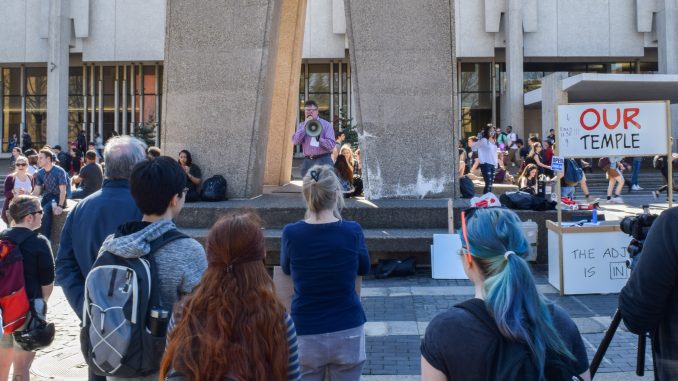
After negotiating for nearly a year to draft a contract, the university and the Temple Association of University Professionals are still working to come together on several key issues.
In December 2015, more than 600 part-time faculty voted to add the 1,400 part-time faculty members to TAUP, the university’s faculty union. Negotiations to add part-time faculty didn’t begin until May 2016, but several of the same issues are still being discussed, officials from the university and TAUP said.
The full-time faculty contract expires in October 2018. TAUP Vice President Steve Newman said “both sides feel the urgency” to add the part-time faculty before negotiations begin for the entire faculty.
Full-time faculty have been unionized since the 1970s, which makes adding adjunct faculty to the existing contract more complicated, said Sharon Boyle, Temple’s vice president of human resources and the university’s chief negotiator.
“Adjunct faculty work in a very different way,” Boyle said. “But we’ve made really good progress on a good number of items.”
Despite making agreements on items like affirmative action, the two parties are still working to define what constitutes a part-time faculty member. Both Newman and Boyle said the two parties are close to agreeing on the terms, but that this definition still hasn’t been finalized.
Negotiators on both sides have voiced their positions on dues deductions — which is the university docking dues directly from union members’ paychecks to go to the union — and maintained that their stances are non-negotiable. TAUP wants the university to deduct these dues, but Boyle said the university will not do so because it’s “administratively very hard” due to part-time faculty’s schedules.
The two parties also continue to disagree on wages. Boyle said the union initially proposed a 43 to 109 percent increase for adjunct faculty, which would increase the current base rate for adjunct faculty from $1,300 per credit to $1,859. The most recent wage increases were between 1 and 3 percent, she added.
But Newman said the university has offered no wage increase to the part-time faculty. He said his position to increase wages is “not negotiable,” adding that the current $1,300-per-credit-hour rate hasn’t been adjusted for inflation, and thus doesn’t account for the rising cost of living.
“A 0 percent raise is off the table,” he said. “We will not agree to that.”
Although part-time faculty make up 51 percent of the teaching staff on Main Campus, the 1,400 instructors only teach about 25 percent of the courses at the university.
Local institutions like the Community College of Philadelphia and Rutgers University have part-time faculty and full-time faculty in their collective bargaining agreements. Newman said these are successful examples to look at while negotiating with the university.
TAUP will host a demonstration in support of adjunct faculty at the Bell Tower on Wednesday at 11:30 a.m. The union hosted a demonstration in February, which prompted Boyle to pen a letter to The Temple News about Newman’s alleged misstatements surrounding part-time faculty conditions.
“TAUP’s public and media strategy is directed at motivating students and others to pressure the university to accede to TAUP’s demands notwithstanding that many would disadvantage both current adjuncts and full-time faculty,” Boyle wrote in the letter, published on March 3.
In response, intellectual heritage adjunct professor Wende Marshall wrote a letter to the editor, published on March 27, arguing that adjunct professors teaching the maximum amount of classes still lives under the cost of living for Philadelphia.
“From my vantage point as an adjunct I see the arc of Temple’s moral universe bending decisively toward rank exploitation,” Marshall added in her letter. “I see a ballooning and overcompensated corps of administrators, and the construction of sparkly new buildings that undercut Temple’s commitment to teaching as the highest priority.”
Adjunct professors have been demonstrating and speaking with students about adjunct working conditions through an “adjunct office” titled “Our Temple,” which was built by Jennie Shanker, TAUP’s chair of adjunct constituency. The stand has been moved around Main Campus to visualize how adjuncts feel about their working conditions at the university, specifically surrounding space issues.
But the criticism of the space issues through the “Our Temple” booth was taken off the negotiating table earlier this year and resolved for a joint committee to address the space issues adjuncts face, officials said.
These demonstrations, Boyle said, are examples of the union attempting to “paint a picture” of the university that is incorrect.
“To me, this kind of strategy of trying to garner sympathy from students is a misrepresentation,” Boyle added.
Shanker said she is working to get a contract for adjuncts because she has worked at Temple for 15 years, with five of them as a full-time faculty member and administrator and the rest as an adjunct professor.
“I can’t do the type of teaching and type of work that I’d like to be able to do for my students, the kind of work that I was doing when I was full-time,” she said. “There’s no way I could possibly focus on my classes and on my students, understand the kind of resources that are available to them if they need help, any number of things that when you’re struggling to get by, are things you can’t offer your students.”
Until the contract is settled, Newman said TAUP will continue to “agitate” through demonstrations on Main Campus.
“The clock is ticking on getting [the contract] done this semester,” Newman said. “I’m hoping that the speed of this can pick up on these crucial issues.”
Gillian McGoldrick can be reached at gillian.mcgoldrick@temple.edu or on Twitter @gill_mcgoldrick.


Be the first to comment